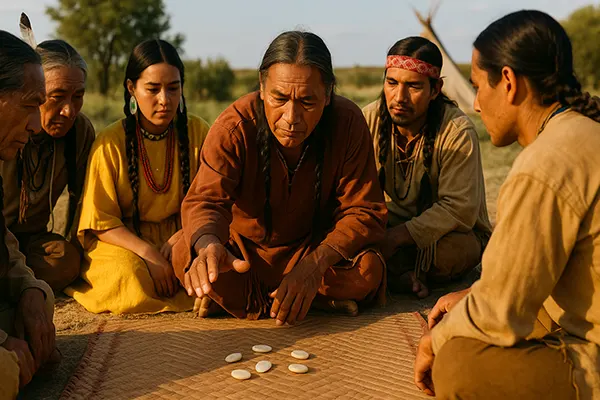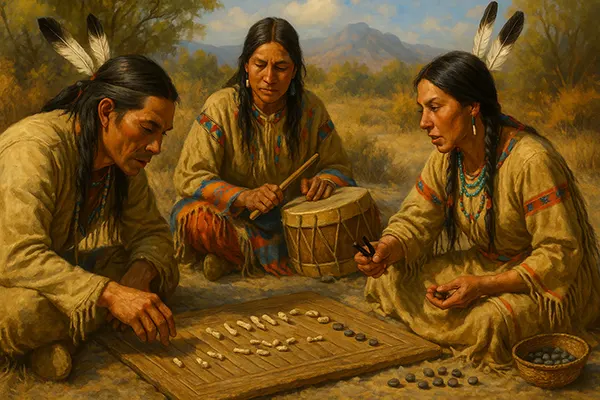For thousands of years, gambling held a vital place in the cultural, spiritual, and social lives of Indigenous peoples across North America. Long before the arrival of European settlers, Native communities had developed complex games of chance and skill, often tied to ceremonial practices, community bonding, and even intertribal diplomacy. These traditions, though partially obscured by colonisation and modernisation, still reflect the ingenuity and significance of Indigenous gambling heritage.
Traditional Games before European Contact
Indigenous communities played a wide variety of games, often adapted to their environment and cultural values. These games were not merely for entertainment; they were interwoven with spiritual beliefs and community customs. One common game was the “hand game” or “stickgame”, played by many tribes from the Great Plains to the Pacific Northwest. Players would conceal a small object in one hand, while the opposing team guessed its location, with rhythmic drumming and singing creating an almost trance-like environment.
Another widely practised game was the dice game, played with carved bones, stones, or shells. Different tribes had their own variations, such as the Cherokee using peach pits and the Iroquois using plum stones. Wagers were made using goods, food, or personal items, and winning was often seen as a sign of favour from spiritual forces.
Foot races, archery contests, and athletic competitions also included wagering elements. Among the Navajo and Apache, racing events could draw entire communities and involved substantial bets. These games fostered intertribal relationships and a strong sense of identity within the tribes themselves.
Community and Spiritual Function of Gambling
Gambling among Indigenous peoples served multiple purposes: spiritual expression, economic exchange, and social cohesion. For the Salish tribes, the stickgame had profound ceremonial importance. It was often played during winter spirit dances and helped strengthen community bonds. Winning or losing was interpreted through a spiritual lens, reflecting balance and fate.
These games allowed for the redistribution of wealth within the tribe, often in a festive and communal setting. Wagers involved everything from blankets and horses to food stores. The outcome could dramatically shift resources, reinforcing interdependence and reciprocity within the community.
Moreover, gambling games were used as a peaceful resolution tool. Tribes would settle disputes or determine hunting rights through gameplay rather than conflict. This approach highlights the deep-rooted respect for harmony and fairness that governed Indigenous societies.
Impact of Colonisation on Gambling Traditions
The arrival of European colonisers in the 16th and 17th centuries began to alter Indigenous gambling practices. Missionaries and settlers often viewed these activities as immoral or idle, and attempted to suppress them through religious conversion and legal restrictions. Ceremonial games were often banned or criminalised, particularly those associated with sacred rituals or gatherings.
Boarding schools and assimilation policies targeted young Indigenous individuals, disconnecting generations from ancestral knowledge—including traditional games. This severance was part of a broader cultural erasure, where Indigenous values and customs were replaced by imposed Western norms.
However, not all traditions disappeared. In some communities, games continued in secret or were adapted to new contexts. Modern iterations of traditional games have re-emerged at powwows and tribal gatherings, often with added cultural education components. This revival helps bridge generational gaps and reclaims the right to cultural expression.
Modern Reclamation and Cultural Revival
In recent decades, there has been a strong movement among Native communities to revive and honour their gambling heritage. Traditional games are now taught in schools on reservations and showcased at cultural events. This resurgence is not simply about entertainment—it’s an act of cultural preservation and identity reinforcement.
Several tribes have documented their historical gaming practices, working with historians and elders to recreate authentic versions. These efforts include crafting traditional dice, restoring ceremonial songs, and teaching youth the rules and meanings of ancient games. Such initiatives reflect a broader decolonisation movement within Indigenous communities.
Importantly, the revival of these games fosters intertribal connection and promotes a shared sense of history. In doing so, it challenges the one-dimensional view of gambling often portrayed in mainstream discourse and underscores the rich, multifaceted role that games once played—and still play—in Indigenous life.

Understanding the Broader Importance Today
Exploring the gambling traditions of North America’s Indigenous peoples offers valuable insight into their worldviews, social structures, and spiritual beliefs. These games were far more than chance-based diversions; they embodied community values, moral teachings, and even survival strategies.
In today’s cultural and political climate, where Indigenous voices are reclaiming space, revisiting and understanding traditional gaming is a form of resistance and empowerment. It asserts the continuity of Indigenous knowledge systems and counters centuries of erasure.
Furthermore, the ongoing documentation and teaching of these games highlight their resilience. They are not relics of a lost world, but living practices that continue to evolve and enrich Indigenous communities. By acknowledging this history, we foster a deeper respect for Indigenous cultures and their contributions to humanity’s diverse social fabric.
Why This Knowledge Matters
The story of Indigenous gambling challenges common stereotypes and presents a nuanced picture of a deeply rooted cultural tradition. It shifts the narrative from one of vice to one of cultural vitality, historical continuity, and adaptive strength.
Understanding this history can help decolonise prevailing views on gambling, especially within educational and legal contexts. It enables institutions to better respect and accommodate Indigenous practices, and to support their role in cultural education and identity formation.
Finally, this knowledge is essential for both Indigenous and non-Indigenous audiences. For Native communities, it reinforces pride and intergenerational continuity. For others, it offers a lens to appreciate cultures often misrepresented or marginalised in dominant narratives.

